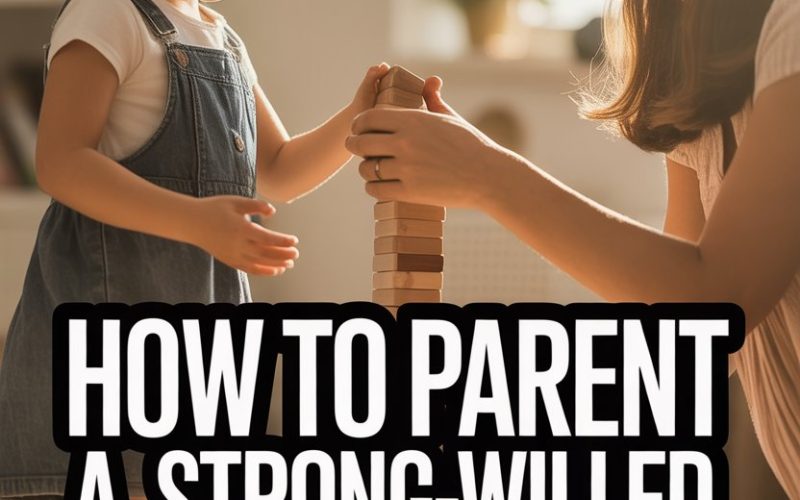Every parent is convinced their child is strong-willed until that fateful day at toddler group when they meet the one who can outstare a Labrador and outlast a parliamentary filibuster.
There’s a difference between a child who knows their own mind and one who could negotiate a Brexit deal—at age four. Parenting a strong-willed kid isn’t for the faint-hearted, but it can be deeply rewarding (and, occasionally, hilarious).
Here’s how to handle your spirited little negotiator with a bit more serenity and a lot less shouting into a cushion in the pantry.
See Their Will as a Strength, Not a Defect
Strong-willed kids aren’t broken. They’re not “difficult” as a personality flaw, even though some days they could test the patience of a Zen master at a traffic jam.
Research from the University of Texas suggests that children who show independence and persistence often grow into successful, self-motivated adults. Phew.
This doesn’t mean you let your mini-lawyer run the show. It does mean reframing their stubbornness as determination. Imagine how handy that grit will be when they’re standing up for themselves later in life.
When you start seeing their qualities as future assets, not current annoyances, even the sixth argument about why shorts are winter-appropriate becomes a little more bearable.
Pick Your Battles (And Sometimes Wave the White Flag)
A strong-willed child will give you plenty of opportunities to practice choosing between hills to die on and hills you can just stroll past with a cup of tea. Not every rule needs to be enforced with military precision.
If your child wants to wear fairy wings to the shops or eat cereal with a ladle, ask yourself: “Does this actually matter, or am I just craving a sense of order?”
If it’s not a health or safety issue, sometimes a little freedom can go a long way. Kids who feel they have some agency tend to resist less overall.
One seasoned mum I know keeps her sanity by asking, “Will this matter in five years?” If not, she saves her energy for the big stuff—like car seats, bedtime, and the eternal broccoli debate.
Stay Calm When They Go Nuclear
When your child’s willfulness goes off like a firecracker, it’s tempting to match their volume and intensity. Resist the urge. Kids feed off our emotional energy, and nothing pours petrol on a meltdown like a grown-up joining in.
Instead, try to model calm—even if you’re faking it harder than your last “mmm, lovely mud pie” at the play kitchen. Take slow breaths, and keep your tone steady.
If you need to, step away for a moment of deep breathing (or a silent scream into a pillow—no judgment).
According to Dr. Laura Markham, author of Peaceful Parent, Happy Kids, parents who stay calm during power struggles help their children learn emotional regulation by example.
Your cool head won’t stop every tantrum, but it teaches your child that explosive emotions don’t move mountains.
Harness the Power of Choice
One thing strong-willed kids crave above all else: control. That doesn’t mean they get to dictate the entire family schedule, but you can offer them limited choices to give a sense of autonomy.
Think: “Do you want to brush your teeth before or after you put on pyjamas?” or “Carrots or peas with dinner tonight?” These aren’t open-ended negotiations; they’re parent-approved options that give your child a voice within boundaries.
Bonus: Giving choices can often preempt a power struggle before it starts.
Research shows that children who are given meaningful choices are more cooperative and develop better decision-making skills.
Giving options doesn’t mean chaos reigns—it means you’re steering the ship while letting your little captain hold the wheel every now and then.
Be Firm, Be Kind, Be Consistent
Strong-willed kids are experts at finding loopholes and testing limits. If your boundaries are as wobbly as a jelly on a trampoline, you’ll soon find yourself out-negotiated and outmanoeuvred.
Clarity is your friend. State expectations simply and kindly: “We use gentle hands,” or “It’s time to turn off the iPad now.” Then follow through.
If you’ve set a consequence, stick with it—no empty threats or marathon debates.
Consistency doesn’t mean never bending. It means your child knows what to expect, which creates a sense of security—even if they claim you’re “the strictest parent in the world.” (A badge of honour. Wear it with pride.)
Empathise Before You Enforce
It’s easy to forget how big feelings can be, especially when you’re three feet tall and limited to only the words you know and the volume your lungs allow.
When your child is digging in their heels, take a second to acknowledge what they’re feeling.
Try: “I can see you’re really upset that it’s time to leave the park. That’s hard.” Empathy doesn’t mean you cave to their demands; it just lets them know you’re on their side, even when you’re sticking to the plan.
Studies have shown that children who feel understood by their parents are more likely to cooperate and less likely to escalate the situation.
Put simply: when kids feel heard, they tend to shout less.
Praise Their Positives, Not Just Their Grit
You might find yourself so caught up in managing confrontations that you forget to notice all the moments your child is being helpful, thoughtful, or just plain adorable.
Make a conscious effort to highlight the good stuff: “I saw you shared your snack with your sister—so kind!” or “You worked so hard on that drawing.”
Specific praise goes further than generic well-dones. Focus on effort, cooperation, and positive risk-taking: “You kept trying even when that puzzle was tricky,” or “You listened carefully when we talked about bedtime.”
This builds self-esteem and motivates more of the same behaviour.
Let Natural Consequences Do the Teaching
Sometimes, the quickest way for a strong-willed kid to learn is by experiencing the results of their own choices—within safe limits, naturally.
If they refuse to wear a coat on a chilly morning (and it’s safe to do so), a five-minute walk to the car will teach them more than any lecture about weather ever could.
The trick is to resist the urge to say “I told you so.” Empathy, again, is key: “Brr, it’s cold! I bet a coat would feel nice now. Want to grab one?”
When kids see that their choices have real outcomes, they start thinking a bit further ahead.
Research published in Child Development suggests that natural consequences encourage children to develop responsibility and independence, without the drama of a power struggle.
Teach Problem-Solving, Not Just Compliance
A strong-willed child wants to be part of the solution, not just follow orders.
When there’s a recurring issue—getting dressed, leaving the playground, eating dinner—ask for their input. “We need to leave soon, but I see you’re having fun. What’s one more thing you’d like to do before we go?”
Problem-solving together gives your child a sense of ownership and helps them learn negotiation skills that’ll serve them long after the tooth fairy has retired.
Sometimes the solutions are surprisingly creative (and sometimes they involve elaborate dance routines—take your wins where you can).
Don’t Take It Personally
When your child is pushing every button, it’s easy to feel like you’re failing or that they’re acting out just to test you. That’s rarely the case. Strong-willed kids are motivated by a need for control, not a desire to ruin your Thursday.
Keep perspective. Remember that your child’s defiance is about them, not you. It isn’t a referendum on your parenting skills.
You’re doing better than you think, and your child’s persistence is something to celebrate—even on the days it makes you wish for a nap that lasts a week.
Find Your Support Crew
Strong-willed kids can exhaust even the most resourceful parent. Don’t go it alone.
Whether it’s swapping stories with other parents at the playground, reading up on positive discipline from trusted sources like Aha! Parenting, or speaking to a family therapist when things feel too hard, sharing the load makes a huge difference.
Your friends with the “easy” kids might not always get it, but there’s a whole community of parents in your corner. They’ll remind you—over a slightly cold cup of tea—that this job is never easy, but it’s worth every exasperated sigh.
A New Kind of Peace Negotiation
Raising a strong-willed child will keep you on your toes, test your patience, and make you rethink every rule you ever set.
It’s not for the faint-hearted, but it’s also full of moments where their spirit shines so brightly you wouldn’t trade them for all the compliant toddlers in the world.
Grace doesn’t mean never losing your cool—it means finding a way back to connection, compassion, and the occasional surrender to fairy wings in public.
If you can do that, you’re not just parenting a strong-willed kid. You’re raising someone who’ll change the world (and possibly your hair colour, one stubborn streak at a time).




